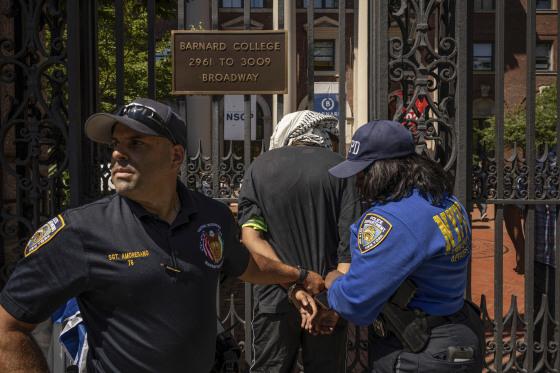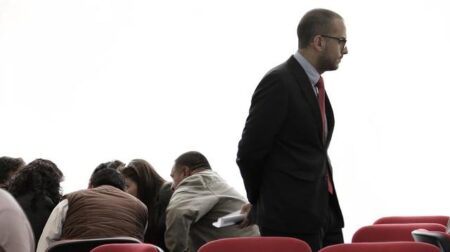Barnard Takes Bold Steps to Combat Antisemitism and Promote Inclusivity
In response to a recent lawsuit alleging ongoing antisemitism and insufficient institutional action, Barnard College has reached a pivotal settlement that commits the school to a series of transformative initiatives. These reforms are designed to cultivate a campus atmosphere where all students feel secure, respected, and valued. Central to this commitment are mandatory diversity and sensitivity training sessions for faculty and staff, the creation of a specialized office dedicated to addressing antisemitic incidents, and the enhancement of confidential reporting systems to ensure timely and transparent handling of complaints.
- Annual Diversity & Sensitivity Training: Focused on combating antisemitism and all forms of discrimination.
- New Antisemitism Response Office: A dedicated unit responsible for prevention, education, and intervention efforts.
- Upgraded Reporting Platforms: Streamlined, confidential channels for students to report incidents safely.
| Initiative | Completion Target | Anticipated Outcome |
|---|---|---|
| Launch of Training Programs | Fall 2024 | Increased Awareness and Sensitivity |
| Establishment of Response Office | Summer 2024 | Efficient Incident Management |
| Reporting System Enhancement | Winter 2024 | Greater Accessibility and Trust |
College leadership has openly recognized the gravity of the issues raised and pledged ongoing transparency throughout the reform process. Regular updates will be shared campus-wide, and student organizations will be actively involved to ensure their perspectives influence policy development. This settlement represents a crucial advancement in Barnard’s dedication to equity, diversity, and the elimination of antisemitism within academic settings.
Policy Overhaul and Educational Efforts to Address Campus Discrimination
Barnard College is undertaking a comprehensive revision of its policies to better protect marginalized communities and promote a culture of accountability. These updates aim to clarify behavioral expectations, strengthen protections against discrimination, and improve transparency in handling complaints. The institution is also expanding resources to monitor antisemitic and other discriminatory incidents, ensuring affected individuals receive prompt and effective support.
Educational programming will be a cornerstone of these reforms, with a series of expert-led workshops, seminars, and facilitated dialogues designed to deepen understanding and foster empathy across the campus community. Key focus areas include:
- Identifying and mitigating implicit biases that influence everyday interactions;
- Enhancing intercultural competence to build stronger, more empathetic relationships;
- Encouraging allyship and solidarity to create a united front against prejudice.
These initiatives aim to nurture a proactive environment where respect and inclusivity are foundational values.
| Program | Focus | Rollout Schedule |
|---|---|---|
| Policy Updates | Reporting Procedures & Accountability | Fall 2024 |
| Diversity and Bias Workshops | Implicit Bias Awareness & Allyship | Spring 2025 |
| Community Engagement Forums | Dialogue and Awareness Building | Quarterly, Ongoing |
Lawsuit Settlement Details and Enhanced Institutional Responsibility
The settlement agreement mandates Barnard College to adopt a robust action plan targeting the eradication of antisemitism and other discriminatory behaviors on campus. This includes compulsory diversity training for all members of the college community and the formation of an independent oversight board tasked with reviewing reported incidents and ensuring accountability. Additionally, the college must upgrade its reporting infrastructure and provide consistent public updates on progress.
Major institutional commitments encompass:
- Establishment of a permanent Office for Equity and Inclusion
- Regular external audits of campus climate by independent experts
- Increased funding for support services tailored to affected students
- Strict enforcement of zero-tolerance policies against discriminatory conduct
| Commitment | Deadline | Responsible Department |
|---|---|---|
| Initiation of Diversity Training | Fall 2024 | Office for Equity and Inclusion |
| Annual Campus Climate Audits | Ongoing | Independent Review Board |
| Expansion of Student Support Programs | Summer 2024 | Student Affairs |
Strategies for Building a Respectful and Inclusive Campus Community
Creating a campus environment where every individual feels respected and secure requires proactive and sustained efforts. Educational programs that address unconscious bias, antisemitism, and other discriminatory behaviors should be mandatory components of student orientation and ongoing academic life. Embedding diversity training throughout the college experience equips community members to identify subtle prejudices and respond effectively.
Equally important is the development of accessible, confidential reporting systems that guarantee prompt and fair responses, thereby fostering trust between students and administration. Institutional transparency can be further enhanced through regular climate assessments and open communication of findings. Collaboration among student groups, faculty, and administrators is essential to crafting policies that reflect the diverse needs and experiences of the campus population.
| Area of Focus | Key Initiatives | Objective |
|---|---|---|
| Education | Workshops, seminars on diversity and inclusion | Raise awareness and reduce bias |
| Support Systems | Confidential reporting, counseling services | Build trust and protect affected individuals |
| Policy Enforcement | Clear anti-discrimination guidelines | Ensure accountability and consistency |
| Community Engagement | Student-led forums and feedback mechanisms | Promote inclusion and diverse representation |
Looking Ahead: Barnard’s Path to an Inclusive Future
Barnard College’s proactive response to allegations of antisemitism and discrimination signals a meaningful commitment to fostering a campus culture grounded in respect and equity. As the institution advances with the implementation of the settlement’s provisions, the effectiveness of these measures will be closely observed by students, faculty, and the broader academic community. This case highlights the ongoing challenges faced by higher education institutions nationwide in addressing bias and underscores the urgent need for sustained, systemic change.













